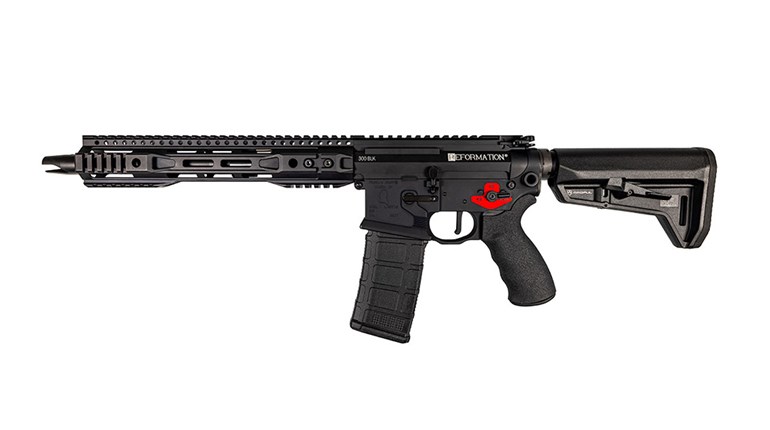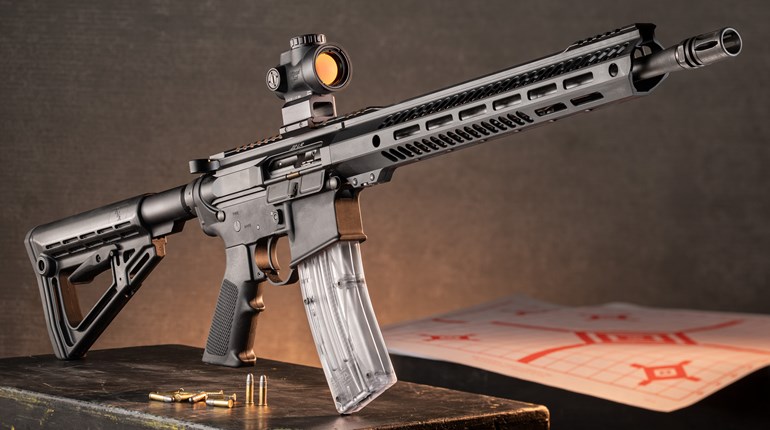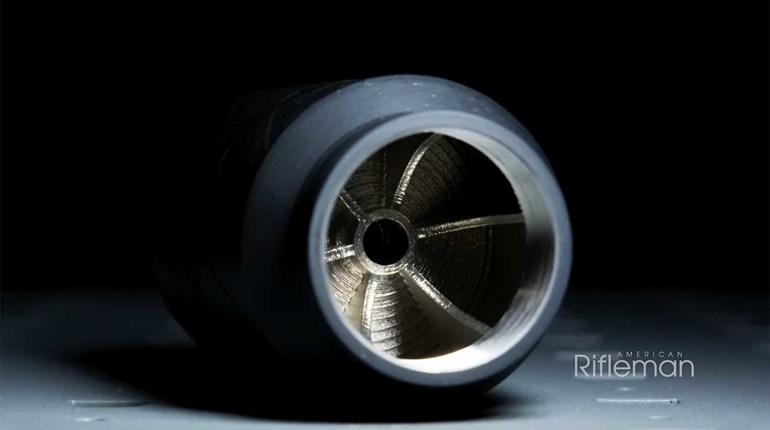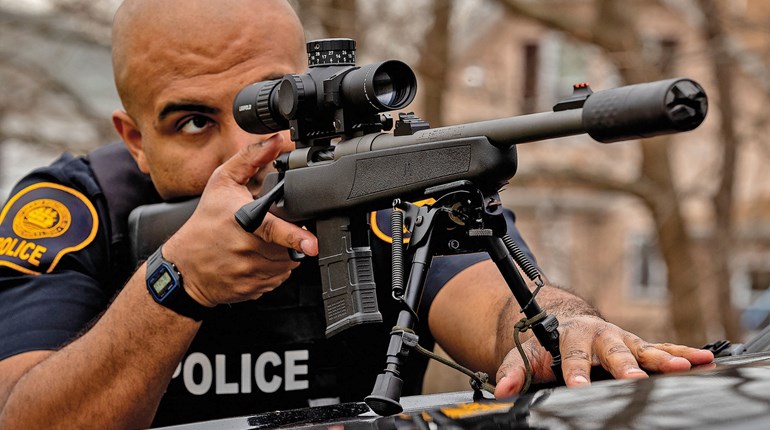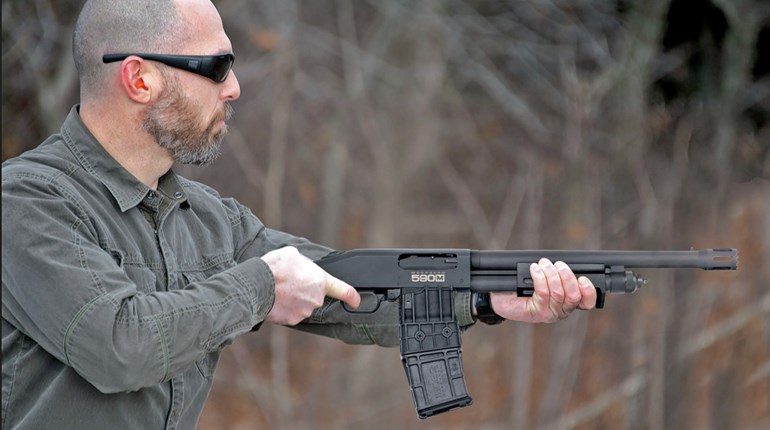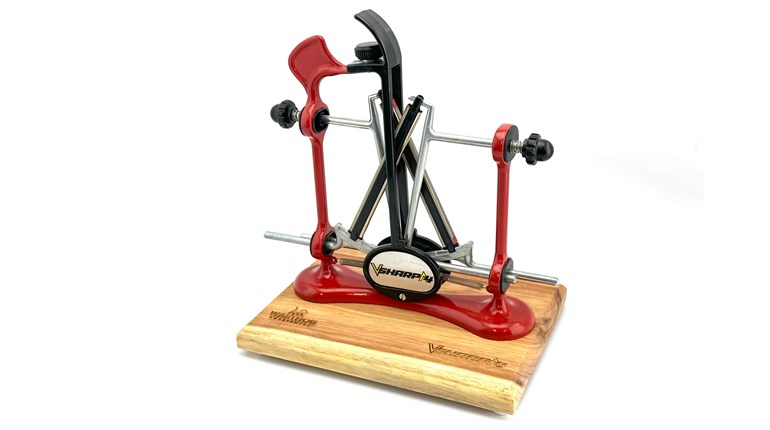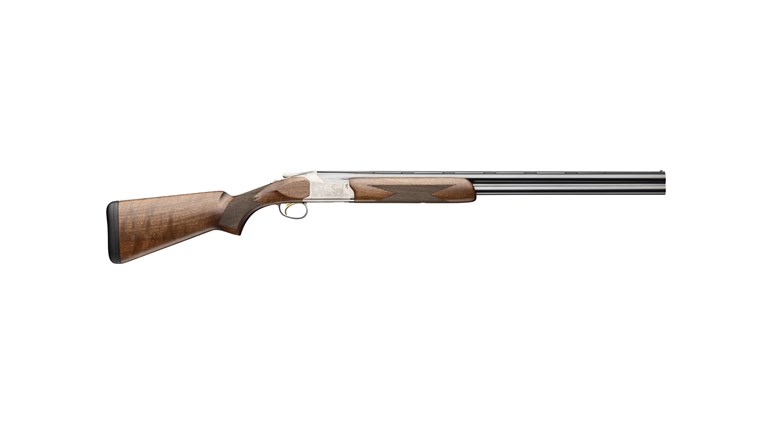
From the beginning, the AR-15 was developed with weight savings in mind. Everything from the innovative gas system to the synthetic stock material was chosen to keep the overall mass to a minimum. Nearly 40 years later, when AR-10 designer Eugene Stoner teamed up with C. Reed Knight Jr. to develop what we now know as the Picatinny rail fore-end, end users began bolting accessories to their ARs. By 2005, one could hardly find a carbine without 2 pounds of stuff hanging off of it, adding weight, bulk and lots of sharp edges to what began as a sleek package. All of these accessories were no doubt great for hunting terrorists, but were overkill for most of us back home. Thankfully, we are seeing a return to the brilliant portability that made the AR America’s rifle—the Rock River Arms RRage Carbine is just such a firearm.
Rock River Arms has built a reputation as a quality maker of modern sporting rifles and offers an extremely diverse list of models and options. I bought my first Rock River Arms carbine on the day that the Clinton semi-auto ban expired in 2004, and have tested more than a dozen since. The AR-style carbine market is flooded with great products, but the choices have become almost overwhelming. We are seeing highly specialized rifles that are fantastic for their intended use, but lack the overall utility of a general-use long gun. Not everyone is running their AR through defensive-rifle classes or prepping for an apocalypse; some users just need a useful “truck gun.” The Rock River Arms RRage Carbine is simple, with clean lines and minimal accessories included. The user can, due to the design’s fundamental modularity, customize to his or her heart’s content or run it “as is” by simply adding iron sights or an optic.

The RRage is a monolithic-style design, which refers to the manner in which the barrel and handguard attach to the receiver. On a true monolithic upper, the receiver and fore-end are made from a single aluminum extrusion, which is not the case on this model. Rock River refers to the RRage as a “monolithic-style” because it is a hybrid of traditional AR and a monolithic design. On a traditional AR-type carbine, the barrel is torqued onto the receiver and is held by what is essentially a locking collar; the handguard then threads onto that collar. On the Rock River Arms RRage Carbine, a large nut secures the barrel to the receiver, and the handguard clamps directly to the same nut using hex bolts. This robust setup provides the sleek visual lines of a monolithic receiver with more flexibility in aftermarket handguards.

The lines of the RRage’s extruded aluminum upper receiver blend virtually seamlessly to those of the carbine-length handguard, which is M-Lok compatible and provides attachment slots at the 3-, 6- and 9-o’clock positions. The receiver’s flattop Picatinny rail continues the full-length of the handguard, providing plenty of real estate for optics, sights and other accessories. There is no forward assist on the Rock River Arms RRage Carbine, which contributes to its slick profile. Highly experienced minds disagree on the necessity of this feature and debating its merits have filled entire articles. If you can’t live without a forward assist, this is not the model for you.

The RRage carbine comes chambered in 5.56 NATO, so it is compatible with both 5.56 NATO and .223 Rem. ammunition—it is safe to fire .223 Rem. in a 5.56 NATO but not the other way around. The chrome-moly barrel is 16 inches long with a lightweight contour and a 1:9-inch rifling twist. With this twist and barrel length, traditional bullets of up to 75 grains should stabilize correctly along with monolithic bullets of up to 70 grains. The barrel is threaded ½-28 tpi and is fit with an A2-style flash hider. This standard thread pattern can accommodate virtually any aftermarket muzzle device. The Rock River Arms RRage Carbine uses traditional AR direct-gas-impingement operation with a carbine-length gas system. A low-profile gas block means that a longer handguard can be attached to this carbine, if desired, since the block allows for clearance underneath.
This carbine uses Rock River Arms’ LAR-15 forged lower receiver and a commercial-diameter receiver extension/buffer tube. The six-position, carbine-style buttstock, pistol grip and individual controls are all standard USGI-type. These universally-serviceable components can be readily swapped for aftermarket parts if the user is looking for something different. The buttstock is equipped with a sling swivel, but no forward attachment point is provided. If a sling is desired, the user will need to source an M-Lok- or Picatinny-rail-compatible front swivel to mount on the fore-end. The only other “must-have” accessory would be an optic and/or a set of sights. The single-stage trigger was the least-impressive attribute on this carbine and broke at a spongy 5.75 pounds.

In order to evaluate the RRage’s accuracy potential as well as its reliability, we mounted a 12X Leupold scope using a Bobro mount. I’ve been shooting AR-style rifles and carbines since the early 1990s so shooting the Rock River Arms RRage Carbine was a bit like riding a bike: Its controls were familiar and everything functioned as advertised. I quickly established a 100-yard zero and began the process of shooting five consecutive five-shot groups with three different types of ammunition. The temperature was in the 90s and, though the barrel got hot, points-of-impact did not wander.

The first load tested was Hornady’s Frontier 68-grain BTHP Match ammunition, which produced five-shot average groups slightly less than 1 MOA. Federal Premium’s 63-grain Fusion MSR ammunition produced the smallest average group size at .83 inch while Hornady Black 62-grain FMJ shot the smallest single group of the day at just .51 inch. Though the RRage’s accuracy performance was good, my experience behind the gun suggests that it is capable of better. It is a challenge to shoot consistent, sub-MOA groups with a trigger that breaks north of 5 pounds. Trading out the factory unit for one of Rock River Arms’ match triggers, or any of the fantastic aftermarket triggers available today, would be an easy fix.
This robust setup provides the sleek visual lines of a monolithic receiver with more flexibility in aftermarket handguards.
Writers often pay a great deal of attention to the recoil impulses of various AR-style designs based on gas-system length, buffer weight, gas-port settings and other incremental modifications; I am guilty of this myself. Longer gas systems and heavier buffers can smooth out effects of the gas-pressure curve and make the gun act more gently. The fact is, for the average shooter who is not trying to win a 3-gun match, a carbine-length gas tube, standard buffer and USGI flash hider work just fine. Tweaking any of the above components can lead to reliability problems and, since the Rock River Arms RRage Carbine functioned with 100-percent reliability, I cannot recommend fixing what is not broken.
Compared to many products on the market today, what jumps out about the RRage is its portability. One could mount a pair of iron sights to this carbine and still have a useful setup that would tip the scales at less than 6 pounds. If we view the AR as a modern replacement to workhorse carbines such as the Winchester 1894, we can see the utility of a simple, compact and lightweight setup such as the RRage. Lights, optics, lasers and vertical foregrips are great for those who seek them, but are not the right choice for every user. The RRage gives the user the freedom to mount such accessories, if desired, but makes for a handy and snag-free package for those who don’t need them.
Rifles packed with premium upgrades are accompanied by hefty price tags. The Rock River Arms RRage Carbine’s straightforward construction and choice of components allows Rock River Arms to achieve a very reasonable MSRP of $759.99, and real-world prices will undoubtedly fall below that mark. That is a tremendous value for a carbine of this quality, particularly when compared to other monolithic-style carbines. This is a useful, accurate and reliable carbine that is plenty of gun for most shooters. If you are in the market for a compact, lightweight and clean-looking AR-style carbine, the RRage is worth a look.











